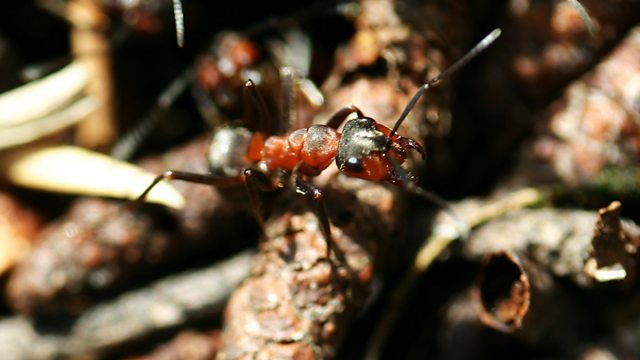For centuries we've peered at them, delighted and terrified at seeing our best and worst traits in miniature. Brett Westwood investigates why we see ourselves in the Ant.
For centuries we've peered at them, delighted and terrified at seeing our best and worst traits in miniature. Brett Westwood investigates why we see ourselves in the Ant. With contributions from the Ant Lab of Nigel Franks, giant ants as seen by Judith Buchanan, slave-making ants as interpreted by John Clarke and Tom Waits, and the robot swarm of Sabine Hauert. Plus St Paul's Cathedral and a whole ant colony between 2 microscope slides. Plus the fearsome threat of H G Wells' The Empire of the Ants, and the films Antz, and THEM!
First broadcast in a longer form : 28th June 2016
Original Producer (2016): Melvin Rickarby
Archive Producer (2023) : Andrew Dawes
Last on
Dr Andrew Polaszek

He is committed to public outreach, science education, and the facilitation of descriptive taxonomy using modern techniques. A current priority is the use of high-quality images to inform society at all levels about the importance of parasitoids and other wasps, as well as bees and ants, as ecosystem service providers.
Professor Judith Buchanan

Through the creative work of , she brings back little-known films from the silent era as a source of pleasurable engagement for contemporary audiences in the UK and elsewhere, thereby helping to ensure the preservation and ongoing life of a valuable but threatened part of our heritage.
She is the author of, among other things, Shakespeare on Film and Shakespeare on Silent Film: An Excellent Dumb Discourse and the editor of The Writer on Film: Screening Literary Authorship. She speaks regularly to public as well as to academic audiences and her voice-overs can be found on the BFIβs newly released βPlay On! Shakespeare in Silent Film'.Β
Twitter:
Dr John Clark

He is currently a lecturer in the School of History and director of the Institute for Environmental History at the University of St Andrews. His teaching and research focus on the history of science, medicine, and environment; and his publications include . In 2014, he was a visiting senior fellow at The Ohio State University.
Professor Nigel Franks

Ant colonies embody all of the most important aspects of biological organisation. In simple terms they are more than the sum of their parts and they are robust flexible systems that are capable of self repair. The fundamental advantage of ant colonies as experimental biological materials is that they can be quickly taken apart and rapidly and easily put together again. This is the reason why we study ant colonies rather than natural neural networks which exhibit similar capabilities but can be experimentally intractable.
Picture: EXI Photography
Dr Sabine Hauert

It has been used to design swarming nanoparticles for cancer treatment and for deploying large aerial swarms for communication relay.Β She is also working towards using automatic swarm design to understand natural self-organised systems such as those found in the brain or the immune system.
Broadcasts
- Tue 28 Jun 2016 11:00ΒιΆΉΤΌΕΔ Radio 4
- Mon 4 Jul 2016 21:00ΒιΆΉΤΌΕΔ Radio 4
- Sun 17 Dec 2023 06:35ΒιΆΉΤΌΕΔ Radio 4


